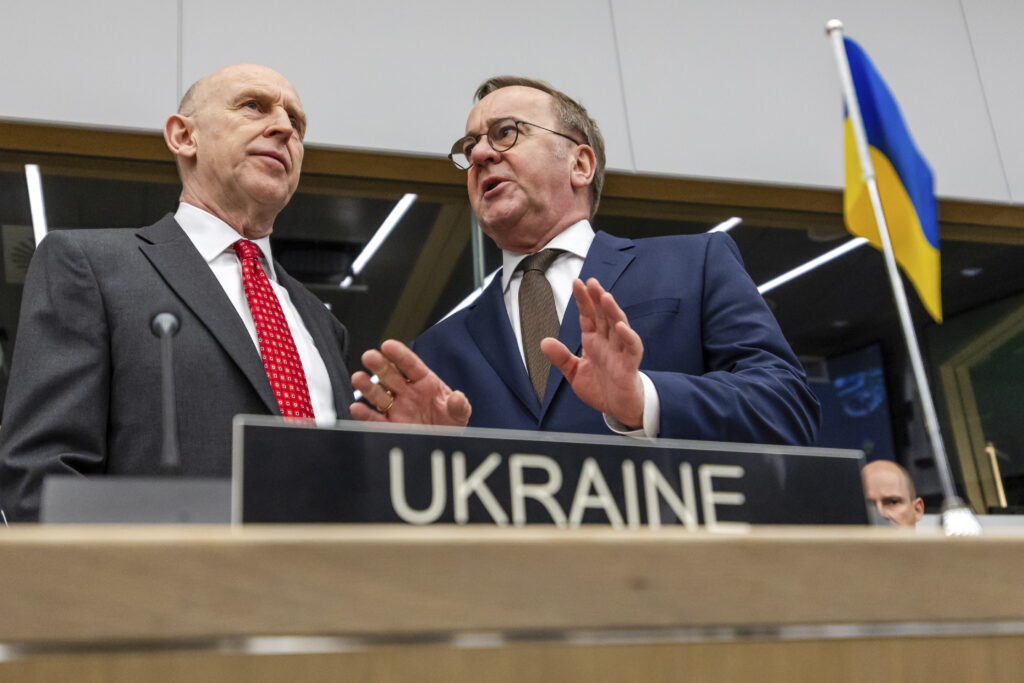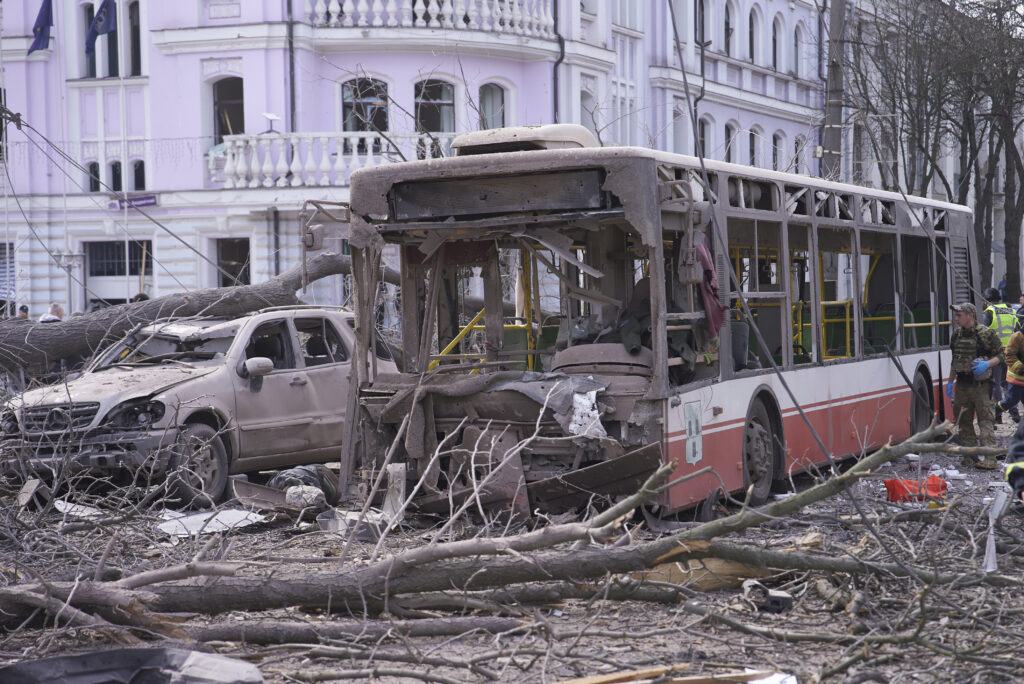Europe Is Moving Fast To Try To Replace America in Backing Ukraine Against Russia
Representatives of 50 countries, meeting at Brussels, commit to giving $24 billion, making the EU the top supplier of military aid to Kyiv.

Europe is moving fast this spring to try to fill America’s shoes in Ukraine and to block Russia’s westward expansion. Signs of the tectonic shift are on display in the tale of two cities.
At Brussels, representatives of 50 nations met Friday and committed to giving Ukraine $24 billion in military aid this year. The European Union foreign policy chief, Kaja Kallas, said the EU is now the top military aid supplier to Ukraine.
Three years ago, Secretary of Defense Austin founded this regular gathering of Ukraine’s Western backers. He presided over 25 meetings. Yet this one was led by the defense ministers of Britain and Germany. Defense Secretary Hegseth dialed in to attend virtually. Since taking office 10 weeks ago, Mr. Hegseth reportedly has not met any officials from Ukraine.
On the same day, 1,200 miles to the east, at Saint Petersburg, President Trump’s special envoy Steve Witkoff met President Putin. On seeing the Russian president, for their third one-on-one meeting, Mr. Witkoff put his right hand on his heart.
Usually signifying honor and sincerity, this gesture drew poor reviews from some Western observers. American journalist Julia Davis, curator of Russian Media Monitor, posted on X: “Witkoff placing his hand over his heart to express his devotion to war criminal Putin and then sheepishly following in tow behind him is utterly disgusting.”

Moving to the concrete from the symbolic, the American military announced last week that it is pulling GIs and equipment from Poland’s Rzeszów-Jasionka Airport. Situated 40 miles west of Ukraine’s border, this airport has served since 2022 as the main logistics hub for Western military aid going to Ukraine.
Jasionka’s two-mile concrete runway, the third longest in Poland, handled up to 95 percent of military aid going to Ukraine, Poland’s defense minister said on a visit in January. The airport has handled Boeing C-17 Globemasters and Lockheed C-130 Hercules, and a stream of visitors, including Secretary of State Blinken and President Biden.
Now, as American military aid to Ukraine peters out, the logistics center will be run by British, German, Polish, and Norwegian forces. Germany now protects the site with its own Patriot air defense batteries.
“After three years at Jasionka this is an opportunity to right-size our footprint and save American taxpayers tens of millions of dollars per year,” General Christopher Donahue, commanding general of U.S. Army Europe and Africa, said in a statement Monday. The Polish defense minister, Władysław Kosiniak-Kamysz, posted Tuesday on X: “Duties previously carried out by U.S. forces in Jasionka are now being taken over by other allies.”
This pullout comes as the Pentagon debates cutting 10,000 American troops from the 80,000 troops now in Europe, NBC reported Tuesday. The proposed cuts would take place largely in Eastern Europe — namely, Poland and Romania. With the Russia-Ukraine war still raging, the plan quickly faced Congressional pushback.
“There are some who believe now is the time to reduce drastically our military footprint in Europe,” Senator Wicker, chairman of the Armed Services Committee, said at a hearing Thursday. “I’m troubled at those deeply misguided and dangerous views held by some midlevel bureaucrats within the Defense Department. They’ve been working to pursue a U.S. retreat from Europe.”
While the Pentagon debated cutting troops in Eastern Europe, Germany last week officially launched in Lithuania its first permanent foreign troop deployment since World War II. Its 45th Armored Brigade was formally activated in a ceremony at Rūdninkai, a fast-expanding military base midway between Vilnius and Lithuania’s border with Belarus, a Russian satellite state. Within two years, the base is to house 5,000 German soldiers and their equipment.

Meanwhile, the Trump administration continues to make concessions to the Kremlin, ostensibly with the goal of softening up Mr. Putin so that he will accept a month-old ceasefire proposal. On Thursday, the American Ambassador to Ukraine, Bridget Brink, a Biden appointee, resigned. No replacement has been named.
Earlier in the week, Mr. Trump exempted Russia and Belarus from global import tariffs he imposed. On Thursday, American and Russian officials met in the Russian consulate at Istanbul to discuss normalizing diplomatic relations and restoring flights between Moscow and New York.
This warming trend increasingly wins open praise from Russian officials. On Saturday, Foreign Minister Sergei Lavrov told a diplomatic forum in Turkey: “President Trump was the first and so far, I think, almost the only one among the Western leaders who repeatedly, with conviction, several times stated that it was a huge mistake to pull Ukraine into NATO. And this is one of the root causes which we quoted so many times.”
In contrast, Germany, and now Japan, show no sign of softening in face of what they see as a military threat from Mr. Putin’s Russia. Yesterday, Palm Sunday in the Christian world, two Russian ballistic missiles crashed into city center of Sumy, capital of a region bordering Ukraine. The attack killed 34 and wounded 117, all apparently civilians. Chancellor Scholz wrote on social media: “These attacks show just what Russia’s supposed readiness for peace is worth.”
On Friday, Germany’s defense minister, Boris Pistorius, told reporters after the gathering at NATO’s headquarters at Brussels: “Given Russia’s ongoing aggression against Ukraine, we must concede that peace in Ukraine appears to be out of reach in the immediate future.”
Mr. Pistorius, a popular politician, is expected to be retained as defense minister in the new coalition government that is to take office May 8. Looking ahead, he said: “We will ensure that Ukraine continues to benefit from our joint military support. Russia needs to understand that Ukraine is able to go on fighting, and we will support it.”
On Russia’s eastern flank, the defense minister of Japan, Gen Nakatani, announced last week that his country wants to participate in the NATO command for Ukraine, based at Wiesbaden, Germany. “Both Japan and NATO face many challenges and our security environment has become increasingly more severe,” Mr. Nakatani said at a press conference alongside NATO’s secretary general, Mark Rutte, who was visiting Tokyo.
Since World War II, Russia has controlled four islands north of Hokkaido that Japan claims as its “Northern Territories.” As a result, Japan and Russia have not signed a peace treaty. Shortly after Russia’s invasion of Ukraine in 2022, Russia placed Japan on its list of “unfriendly countries.” Since then, Russia has stepped up joint air and naval maneuvers with China. This prompted Japan to approve a record-high defense budget last December.

